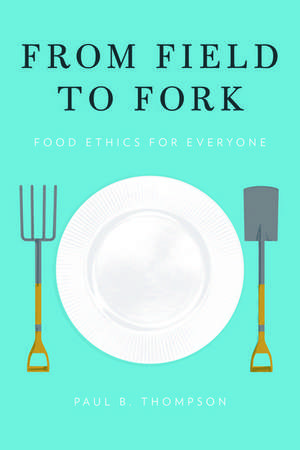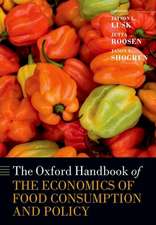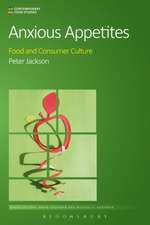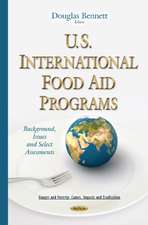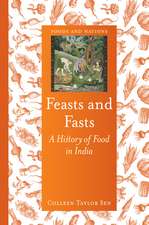From Field to Fork: Food Ethics for Everyone
Autor Paul B. Thompsonen Limba Engleză Paperback – 30 iul 2015
| Toate formatele și edițiile | Preț | Express |
|---|---|---|
| Paperback (1) | 210.17 lei 3-5 săpt. | |
| Oxford University Press – 30 iul 2015 | 210.17 lei 3-5 săpt. | |
| Hardback (1) | 817.64 lei 31-37 zile | |
| Oxford University Press – 30 iul 2015 | 817.64 lei 31-37 zile |
Preț: 210.17 lei
Nou
Puncte Express: 315
Preț estimativ în valută:
40.22€ • 42.10$ • 33.47£
40.22€ • 42.10$ • 33.47£
Carte disponibilă
Livrare economică 10-24 martie
Preluare comenzi: 021 569.72.76
Specificații
ISBN-13: 9780199391691
ISBN-10: 0199391696
Pagini: 344
Dimensiuni: 140 x 208 x 28 mm
Greutate: 0.32 kg
Editura: Oxford University Press
Colecția OUP USA
Locul publicării:New York, United States
ISBN-10: 0199391696
Pagini: 344
Dimensiuni: 140 x 208 x 28 mm
Greutate: 0.32 kg
Editura: Oxford University Press
Colecția OUP USA
Locul publicării:New York, United States
Recenzii
Once in a while somebody writes an important book near the end of a long, distinguished career. Paul B. Thompson, after 40 years in the business, accomplished this in his recent book: From Field to Fork, food ethics for everyone. With the eye of a philosopher and the rigor of an agricultural economist - Thompson is both - he covers big ideas about food ... the book's strength is its broad swath. It leaves deeper coverage to the motivated reader and he cites over 350 references to point the way. If you want to hack your way through the thicket of food ethics, From Field to Fork is a good place to start. Splendid work, Dr. Thompson.
A sensible and engaging intorduction to food ethics.
Throughout From Field to Fork, Thompson analyzes a variety of aspects of our contemporary food system, including its relation to obesity, social injustice, livestock welfare, an individuals dietary choice, localism, environmental impact and genetically modified food. With each subject, he goes through some of the ethically relevant information and gives an account of common ethical arguments made about that subject, but his writing does not side with one approach over anotherI would highly recommend this one to anyone already interested in the field of dietary ethics, or a related field, and especially anyone who is considering writing on the topic.
From Field to Fork provides a clear, composed foray into the different ways to think about such unwieldy ethical problems as GMOs, meat eating, the treatment of livestock, and charitable food aid undercutting subsistence farmers livelihoods.
I would recommend this book as essential to anyone writing in the field of dietary ethics, even if just to check and make sure that there isn't an opposing harm they aren't considering. I believe this book stands out as unique in its field as a result of who wrote it; you can tell this book was written by an expert in the field and he does a good job summarizing the source material and its reception, both in its own field and more widely in philosophy.
From livestock welfare to obesity and social injustice, this thoroughly researched book will stimulate debate and informed choices.
this must be the most comprehensive and accessible book on the topic by someone who is both highly informed and sympathetic to different approaches and philosophies.
Thompson convincingly shows how food production and food consumption are linked to ethical issues regarding social justice, the environment, and risk. Drawing on three decades of scholarship, he constructs a map of the field that brings together often disconnected discussions concerning (among many other things) poverty, obesity, animal welfare, environmental protection and gene technology. The book clearly lives up to its subtitle, 'Food Ethics for Everyone,' as it is a highly accessible, comprehensive and fair-minded guide to the field.
From Field to Fork makes it clear that every food choice has ethical implications and that sorting out these implications from the science and politics of food is anything but simple. The ethical issues discussed in this book are fascinatingly complex and deserve the serious debates they are sure to stimulate. If ever a book provided food for thought, it's this one.
Who eats what, and the journey that food takes - 'field to fork' as Thompson aptly puts it - have becomes major concerns worldwide. The long food way, the web of entanglements connecting my plate to our planet, can overwhelm us - especially when it proves fraught with ethical problems. Who is eating too little, too much, fairly, freely, with what benefits and harms to whom? Here is an excellent moral analysis, a guide from growing in earth to flourishing in the community of life on Earth.
Thompson is the outsider's insider. Having worked within and beside top programs in agricultural research throughout his career, he is also sympathetic toward the alternatives to current agricultural production and their advocates. From Field to Fork offers an even-handed ethical analysis that emphasizes making better choices rather than deriving rigid rules based in ideology. This book should set the agenda for the emergent food ethic.
A sensible and engaging intorduction to food ethics.
Throughout From Field to Fork, Thompson analyzes a variety of aspects of our contemporary food system, including its relation to obesity, social injustice, livestock welfare, an individuals dietary choice, localism, environmental impact and genetically modified food. With each subject, he goes through some of the ethically relevant information and gives an account of common ethical arguments made about that subject, but his writing does not side with one approach over anotherI would highly recommend this one to anyone already interested in the field of dietary ethics, or a related field, and especially anyone who is considering writing on the topic.
From Field to Fork provides a clear, composed foray into the different ways to think about such unwieldy ethical problems as GMOs, meat eating, the treatment of livestock, and charitable food aid undercutting subsistence farmers livelihoods.
I would recommend this book as essential to anyone writing in the field of dietary ethics, even if just to check and make sure that there isn't an opposing harm they aren't considering. I believe this book stands out as unique in its field as a result of who wrote it; you can tell this book was written by an expert in the field and he does a good job summarizing the source material and its reception, both in its own field and more widely in philosophy.
From livestock welfare to obesity and social injustice, this thoroughly researched book will stimulate debate and informed choices.
this must be the most comprehensive and accessible book on the topic by someone who is both highly informed and sympathetic to different approaches and philosophies.
Thompson convincingly shows how food production and food consumption are linked to ethical issues regarding social justice, the environment, and risk. Drawing on three decades of scholarship, he constructs a map of the field that brings together often disconnected discussions concerning (among many other things) poverty, obesity, animal welfare, environmental protection and gene technology. The book clearly lives up to its subtitle, 'Food Ethics for Everyone,' as it is a highly accessible, comprehensive and fair-minded guide to the field.
From Field to Fork makes it clear that every food choice has ethical implications and that sorting out these implications from the science and politics of food is anything but simple. The ethical issues discussed in this book are fascinatingly complex and deserve the serious debates they are sure to stimulate. If ever a book provided food for thought, it's this one.
Who eats what, and the journey that food takes - 'field to fork' as Thompson aptly puts it - have becomes major concerns worldwide. The long food way, the web of entanglements connecting my plate to our planet, can overwhelm us - especially when it proves fraught with ethical problems. Who is eating too little, too much, fairly, freely, with what benefits and harms to whom? Here is an excellent moral analysis, a guide from growing in earth to flourishing in the community of life on Earth.
Thompson is the outsider's insider. Having worked within and beside top programs in agricultural research throughout his career, he is also sympathetic toward the alternatives to current agricultural production and their advocates. From Field to Fork offers an even-handed ethical analysis that emphasizes making better choices rather than deriving rigid rules based in ideology. This book should set the agenda for the emergent food ethic.
Notă biografică
Paul B. Thompson has been a leading scholar in food ethics for over thirty years. He was present at the founding of three professional societies for food ethics and has served in an advisory capacity for the U.S. National Research Council, the Food and Agricultural Organization of the United Nations, Genome Canada, and Wageningen University and Research Institute in the Netherlands , among others. He edited the Encyclopedia of Food and Agricultural Ethics (Springer) and writes a blog for Thornapple Community Supported Agriculture in Lansing MI.
